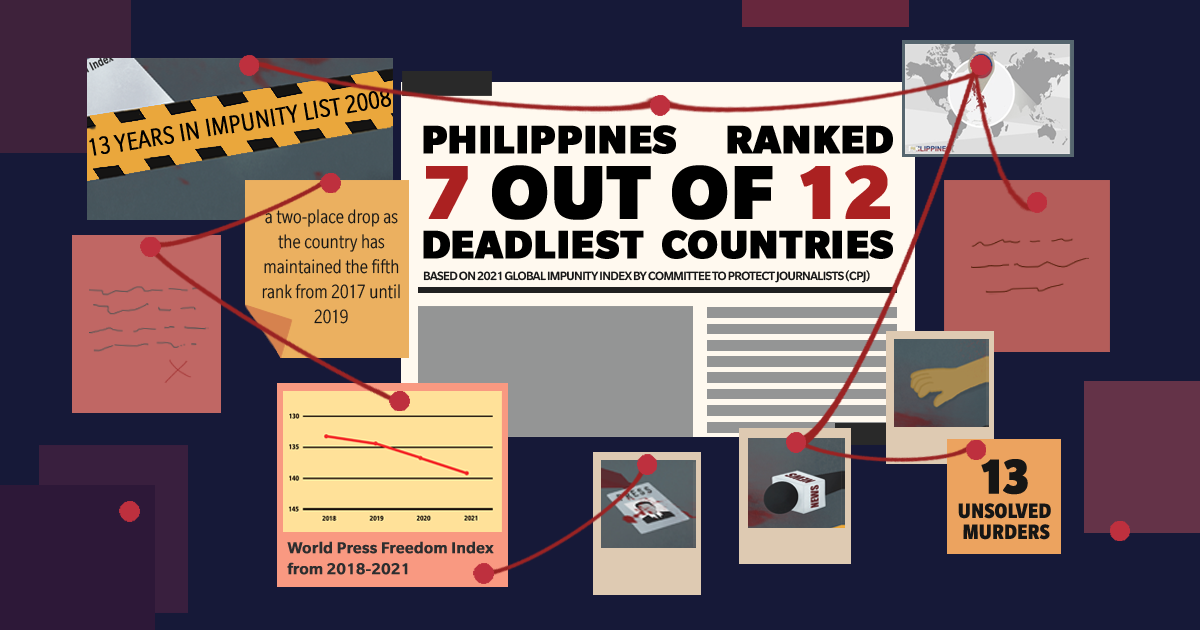
In bringing out truth and information to the public, journalists put their lives on the line as they face a risk of being silenced amidst the growing culture of violence against the truth. United Nations Educational, Scientific and Cultural Organization (UNESCO) even reported that one media worker was killed every four days on average around the world.
In the Philippines, the United Nations Human Rights Council (UNHRC) pointed out that the killings suffered by Filipino journalists are by incitement to violence from “the highest government officials.” The murders have been growing in number, without repercussions and consequences, and even remain uninvestigated, unresolved, and unpunished.
Furthermore, this pervasive climate of impunity has put the country under the spotlight of various international press freedom organizations citing reasons why it is one of the worst nations in the world to work as a journalist.
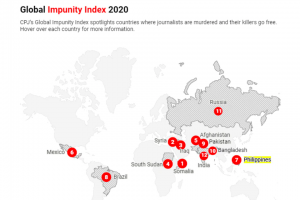
A deadly battlefield
Based on the 2021 Global Impunity Index by Committee to Protect Journalists (CPJ), the Philippines ranked 7 out of 12 deadliest countries with the highest number of unresolved journalist killings. The country maintained its position in 2020 as CPJ monitored 13 unsolved murders from Sept. 1, 2011 to Aug. 31, 2021.
This seventh spot was a two-place drop as the country has maintained the fifth rank from 2017 until 2019. The country, however, has been on the said impunity list for 13 years, since its inception in 2008.
Furthermore, the CPJ cited that the ‘improvement’ was because of the infamous 2009 Maguindanao massacre in which the former Maguindanao Mayor Datu Andal Ampatuan Jr., his brother Zaldy Ampatuan, and their cohorts were finally convicted for the gruesome murder of 58 people—32 of whom were from the media.
Considered as the “trial of the decade”, it is only in 2019 that these men have been found guilty of murder, sentenced to up to 40 years of life imprisonment without parole.
“The Ampatuan case took a full decade to try, and the chief defendants […] have appealed their convictions. In the Philippines’ labyrinthine and politicized legal system, their legal challenges could take several years to be tried and the possibility of their acquittal on appeal still looms large,” CPJ cited in its 2020 report.
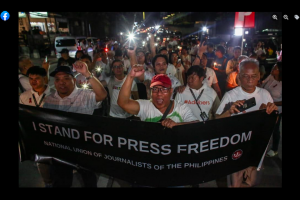
On the other hand, in the World Press Freedom Index for 2021 by Reporters Without Borders (RSF), the country dropped even further in the list, ranking 138th among 180 nations. In its report, RSF stated that the Philippines is one of the nations where press freedom is classified as bad or very bad, and where it is blocked.
This is also the fourth consecutive year that the country dropped in the index, in accordance with the level of freedom given to journalists. In 2020, the country was 136th, then 134th in 2019, and 133rd in 2018.
Recent bloodbaths
The National Union of Journalists of the Philippines (NUJP) reported 22 murdered Filipino journalists since President Rodrigo Duterte took power in 2016. The freedom of expression of these journalists, who were killed in the mere exercise of their profession—reporting on organized crime, local politics, and corruption—was revoked indefinitely, and led to a deprived democratic, free and participative society.
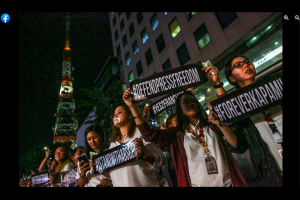
One of these journalists is radio broadcaster Cornelio “Rex Cornelio” Pepino who was murdered in Dumaguete City in May of last year—the same day that the government ordered the country’s largest broadcaster ABS-CBN to stop operating. He was the 16th journalist to be slain under the administration and the first to be killed during the pandemic lockdown. His death was followed by five more Filipino journalist killings up to this day.
The most recent addition to the list is Orlando “Dondon” Dinoy who was murdered last Oct. 30 inside his own apartment in Bansalan, Davao del Sur. According to NUJP, Dinoy worked as a reporter for an online news site, a radio host, and a correspondent for various daily newspapers. One of the theories, the town police claimed, was that Dinoy was slain as a result of his work in the media.
Meanwhile, in observance of 2018 World Press Freedom Day, Presidential Spokesperson Harry Roque denied that the country had a culture of impunity and claimed that the number of media deaths had decreased under the Duterte administration. “Well I dispute that […] bumaba po talaga ang patayan sa Pilipinas, at bumaba po ang ranggo ng Pilipinas doon sa mga listahan ng most dangerous places in the world for journalists,” Roque said.
Consequently, on August 8, 2020, a day after the Social Weather Stations released its latest poll results on the public’s assertion that there is danger in publishing anything critical of the administration, Roque further affirmed that the administration has respected the freedom of speech and the freedom of the press in the country.
However, RSF cited the continued various forms of threats and attacks of administration on the media. This notably includes the efforts of the administration to force ABS-CBN off the air and the widely publicized harassment faced by Rappler and its chief executive officer, the Nobel Prize laureate Maria Ressa.
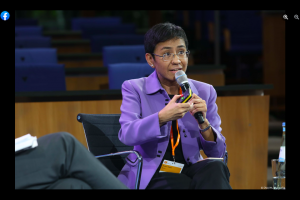
Triumph of truth over lies
Amid the threats, killings, and harassment, Maria Ressa’s Nobel Peace Prize last October could not have come at a more opportune moment. Together with Russian journalist Dmitry Muratov, they were both awarded the Nobel Peace, the first prize for journalists in 86 years. Journalists like them have risen to the occasion in speaking truth to power and defending the freedom of the press.
Moreover, Ressa’s victory is a vindication for all Filipino journalists who were slain.
According to Norwegian Nobel Committee Chairwoman Berit Reiss-Andersen, the laureates were cited for their valiant efforts to protect freedom of expression in their countries.
Reiss-Andersent further said that they are representatives of all journalists who fight for this ideal in a world where democracy and press freedom are increasingly threatened. “Free, independent and fact-based journalism serves to protect against abuse of power, lies, and war propaganda,” she added.
In addition, according to the press release of the Norwegian Nobel Committee, Ressa’s efforts to protect freedom of expression, which is a precondition for democracy and long-term peace, paved the way against the hostility confronting her: facing 11 cases in 2018, a conviction, an accusation of fraud, and tax evasion, and eight warrants in 2019.
Despite all of these, her triumph serves as “a recognition of how hard it is to be a journalist today” who have been subjected to relentless attacks: harassed, red-tagged, arrested, and killed, for braving the wrath of political leaders and exposing corruption and misrule.
*
As long as there is continued injustice between the government and its critics, the bloodshed will remain. As staying informed and knowing the truth are basic fundamental rights, justice is all about contributing to a less informed public, holding perpetrators of these killings accountable, reparations for the slain journalists, and the non-repetition of the crimes and murders committed.

